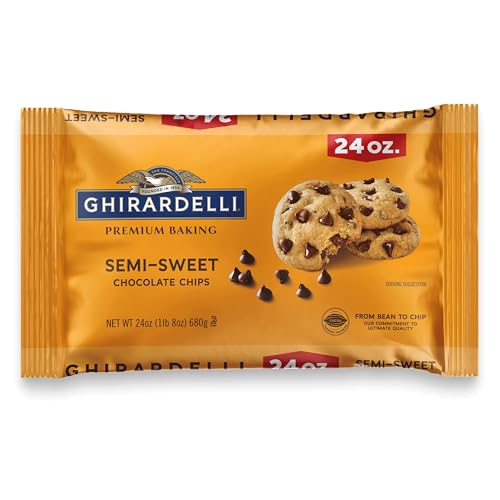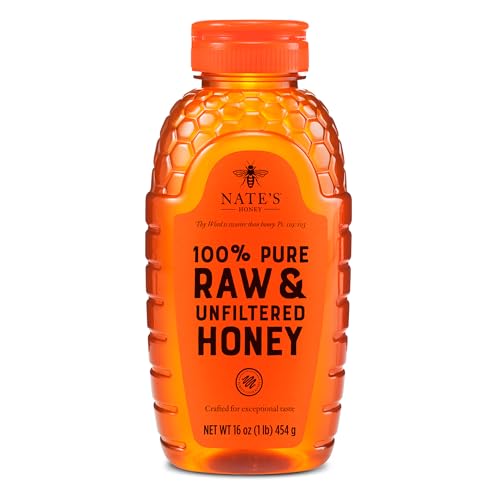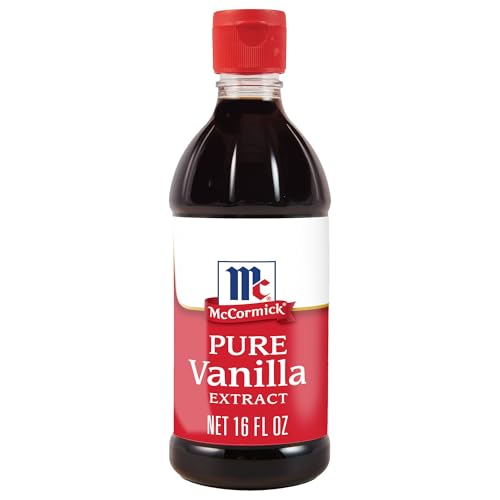Slow Cooker Recipes: Easy Meals, Less Effort!
Family-friendly dishes for busy people — quick prep, delicious results.
Grab yours for $4Are you tired of wincing at the bitter taste of your morning coffee? You’re not alone. Many coffee lovers dream of enjoying a smooth, flavorful cup without that harsh bite that often accompanies traditional brews.
The good news is that non-bitter coffee isn’t just a fantasy—it’s completely achievable with the right beans, brewing methods, and techniques. Whether you’re new to coffee or a seasoned enthusiast looking to refine your palate, understanding what creates bitterness and how to avoid it can transform your coffee experience from acceptable to exceptional.
Why Many People Avoid Coffee
Coffee’s notorious bitterness turns away countless potential enthusiasts who might otherwise enjoy this beloved beverage. Many first-time drinkers experience an immediate aversion to coffee’s harsh notes, creating a lasting negative impression. This bitterness often stems from over-extraction, poor-quality beans, or excessively dark roasts that amplify the naturally bitter compounds.
Sensitive taste buds detect these bitter elements more intensely, making coffee particularly challenging for “supertasters” who experience flavors more vividly than others. Acidity in coffee also contributes to the problem, creating a sharp, sour sensation that some find equally unpleasant.
Health concerns further complicate the relationship with coffee, as many individuals avoid it due to caffeine sensitivity, digestive issues, or sleep disruptions. According to a 2023 consumer survey, 42% of non-coffee drinkers cited bitterness as their primary reason for avoidance, while 31% mentioned physical discomfort after consumption.
“I spent years thinking I simply wasn’t a ‘coffee person’ because every cup I tried tasted unbearably bitter,” shares Rikki Manny, “until I discovered properly brewed light roasts that completely transformed my perception of what coffee could taste like.”
Understanding these barriers helps identify answers for those seeking to enjoy coffee without the harsh bitterness that has historically defined the beverage for so many reluctant consumers.
Understanding Coffee Bitterness

Coffee bitterness stems primarily from chemical compounds created during roasting, not from the raw beans themselves. Knowing what causes bitterness helps you identify and avoid it, leading to a more enjoyable coffee experience.
The Science Behind Bitter Taste
Bitterness in coffee comes from two main compounds: chlorogenic acid lactones and phenylindanes. Light to medium roasts contain more chlorogenic acid lactones, which produce a milder bitterness that many find pleasant. As roasting continues, these compounds break down into phenylindanes, creating the stronger, lingering bitterness characteristic of darker roasts. Caffeine contributes only about 15% to coffee’s overall bitterness, contrary to what many believe. The chemical transformation during heating significantly alters the flavor profile of the beans, creating varying levels of bitter compounds depending on roast duration and temperature.
Common Causes of Bitter Coffee
Roasting level plays the most important role in determining how bitter your coffee tastes. Dark roasts contain higher concentrations of phenylindanes, creating that harsh, lingering bitterness many find off-putting. Lighter roasts maintain more of the bean’s original flavors with less intense bitter notes. The chemical breakdown during roasting transforms chlorogenic acids in green beans into bitter compounds, with higher temperatures and longer roasting times amplifying this effect.
Your genetic makeup also influences how you perceive bitterness in coffee. Some people possess more sensitive taste receptors that intensify bitter flavors. Rikki Manny discovered this firsthand, noting: “For years I thought I hated all coffee until I learned about different roast levels. Switching to a light roast completely transformed my experience—suddenly I could taste fruit and chocolate notes instead of just bitterness.” This personal discovery mirrors what many former coffee-avoiders experience when they find properly prepared, less bitter options.
Types of Coffee That Are Naturally Less Bitter
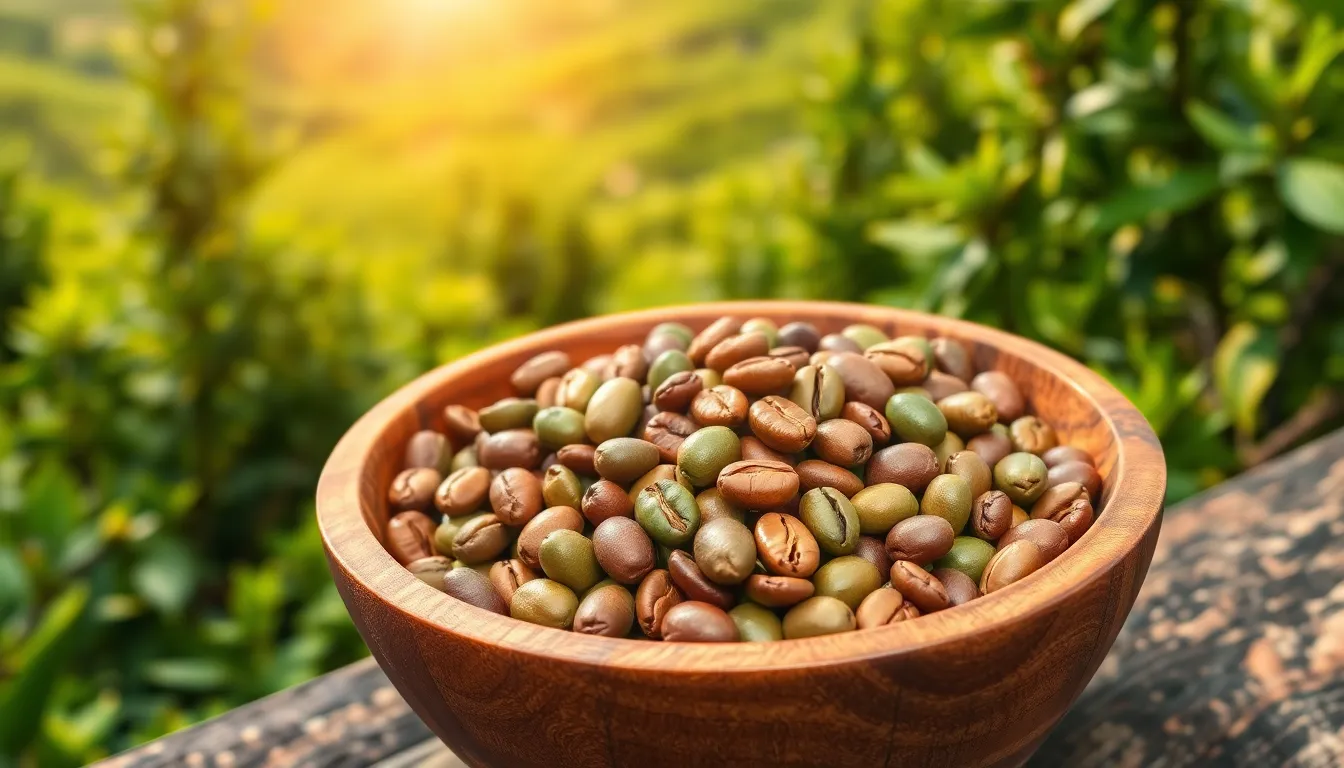
Not all coffee delivers that harsh punch to your palate. Certain coffee varieties naturally contain fewer bitter compounds, making them ideal choices for those seeking a smoother cup. Here’s what to look for when shopping for beans that won’t leave you wincing.
Arabica Beans: The Smoother Choice
Arabica beans stand as the gold standard for lower bitterness in the coffee industry. These premium beans contain significantly fewer bitter compounds like chlorogenic acid and lactones compared to their Robusta counterparts. The flavor profile of 100% Arabica coffee offers more nuance, with notes that can range from fruity to chocolatey depending on their origin.
Ethiopian Arabica beans deserve special mention for their naturally sweet, sometimes berry-like flavors that minimize bitterness. Colombian beans also deliver consistently smooth results with chocolate and caramel undertones that please even sensitive palates.
“I never thought I’d enjoy black coffee until I tried a single-origin Ethiopian Arabica,” shares Rikki Manny. “The difference was astounding—I could actually taste fruit notes instead of that burnt rubber flavor I always associated with coffee.”
Specialty Varieties Worth Seeking
Several specialty Arabica varieties stand out for their exceptional sweetness and minimal bitterness:
- Gesha/Geisha: This prized variety commands high prices for its remarkably floral profile and tea-like delicacy with virtually no bitterness
- Bourbon: Known for its natural sweetness and smooth, balanced cup with subtle fruit notes
- Typica: One of the oldest coffee varieties, offering clean cups with mild acidity and pleasant sweetness
- Pacamara: A larger bean variety that produces a complex cup with honey-like sweetness when properly roasted
Regions That Produce Smoother Beans
Coffee’s growing environment significantly impacts its bitterness level. Beans from these regions typically produce less bitter brews:
- Central American highlands (Guatemala, Costa Rica): Known for balanced, sweet coffees with chocolate notes
- Ethiopian Yirgacheffe: Famous for floral, citrusy profiles with minimal bitterness
- Colombian high-altitude farms: Produce beans with caramel sweetness and mild, pleasant acidity
Avoid Robusta or Use Sparingly
Robusta beans contain approximately 2-3 times more caffeine than Arabica, directly contributing to increased bitterness. These beans are common in inexpensive supermarket brands and many espresso blends where that strong, bitter profile is actually desired. Check package labels carefully—if they don’t specifically state “100% Arabica,” the product likely contains bitter Robusta beans.
Light Roast Coffee Options
Light roasts preserve more of coffee’s natural flavors and contain fewer bitter compounds than their darker counterparts. The shorter roasting time prevents the formation of phenylindanes—compounds responsible for harsh, lingering bitterness in dark roasts. Popular light roast options known for smoothness include Lifeboost Light Roast, Coffee Bros. Light Roast, and Koa Coffee Estate Medium Roast.
Many coffee enthusiasts discover that light roasts reveal completely different flavor dimensions. Rikki Manny recounts, “Switching to light roasts was like discovering a new beverage entirely. Suddenly I could taste bright notes of citrus and berries that were previously masked by bitterness.”
Low-Acid Coffee Varieties
Low-acid coffees offer another path to reducing perceived bitterness, as acidity can intensify bitter notes on the palate. These smoother options come from exact growing regions or through specialized processing methods:
- Beans from Brazil and Sumatra naturally contain less acid
- Monsoon Malabar from India undergoes unique processing that reduces acidity
- Cold brew preparation method cuts acidity by up to 70% regardless of bean type
- Swiss Water Process decaf coffees maintain flavor while reducing both caffeine and acid content
When selecting beans that won’t deliver a bitter punch, prioritize 100% Arabica varieties, particularly from Ethiopia or Colombia, and opt for lighter roast profiles to experience coffee’s naturally sweeter side.
Brewing Methods for Smoother Coffee
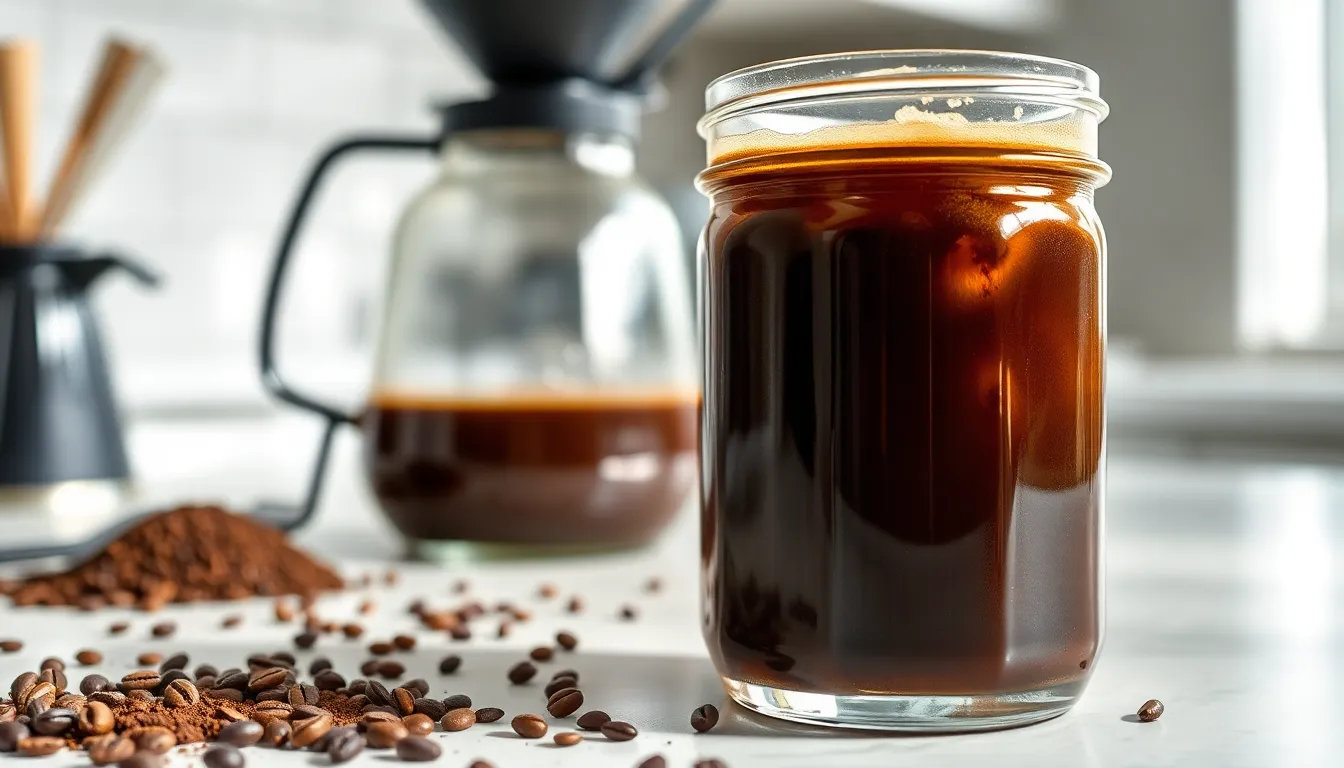
The brewing method you choose significantly impacts your coffee’s bitterness level. Several techniques can extract the delicious flavors while leaving bitter compounds behind, creating a more enjoyable cup.
Cold Brew: The King of Smooth Coffee
Cold brew coffee stands out as the most effective method for eliminating bitterness. This technique involves steeping coarsely ground coffee in cold or room temperature water for 12-24 hours in your refrigerator. The cold water extraction process doesn’t draw out many of the bitter compounds that hot water typically releases, resulting in a naturally sweeter, mellower flavor profile. After brewing, you’ll have a coffee concentrate that can be diluted with water or milk according to your taste preferences. Many coffee enthusiasts appreciate cold brew’s remarkably smooth character and reduced acidity, making it perfect for those who find traditional hot brewing methods too harsh.
Pour-Over Techniques for Reduced Bitterness
Pour-over brewing offers precise control over variables that affect bitterness in your coffee. To achieve a smoother cup, start with a coffee-to-water ratio of 1:16 (such as 15 grams of coffee to 240 milliliters of water). Begin the brewing process with a blooming phase—pour a small amount of hot water over the grounds and let them release gases for about 30 seconds. Your pouring technique matters too; maintain a circular motion with consistent water flow to ensure even extraction throughout the coffee bed. The total brew time should fall between 2.5-3 minutes to extract desirable flavors without crossing into the bitter territory of over-extraction. This method allows you to highlight the coffee’s natural sweetness while minimizing unwanted bitterness.
How to Modify Your Coffee to Reduce Bitterness

Coffee’s bitter flavor can be significantly reduced through simple modifications to your brewing process and ingredients. These adjustments allow you to enjoy coffee’s complex flavors without the harsh notes that might otherwise dominate.
Adding Ingredients That Cut Bitterness
Fatty ingredients effectively neutralize coffee’s bitter compounds. Dairy products like cream or plant-based alternatives such as almond, oat, or soy milk create a smoother taste profile by coating your taste buds and balancing the bitter elements. A pinch of salt works remarkably well at diminishing bitterness—more effectively than sugar—while simultaneously reviving stale coffee flavors.
Sugar naturally masks bitter notes by adding sweetness that competes with bitter receptors on your palate. Spices like cinnamon add complexity to your brew, tricking your brain into focusing on warm, aromatic notes rather than bitterness. Citrus additions, such as a splash of lemon juice or orange rind, introduce acidity that counterbalances bitter compounds for a more rounded flavor experience.
Adjusting Grind Size and Water Temperature
The coarseness of your coffee grounds directly impacts extraction rates and bitterness levels. Coarser grinds prevent over-extraction, particularly important in brewing methods like French press or pour-over where water and coffee interact for extended periods. This adjustment alone often transforms an unpleasantly bitter cup into a smooth, flavorful experience.
Water temperature plays a crucial role in flavor extraction from coffee grounds. Maintaining temperatures between 195°F and 205°F ensures optimal extraction without pulling out excessive bitter compounds. Hotter water tends to extract more bitter elements, so precise temperature control creates a noticeably smoother taste.
Best Coffee Brands Known for Low Bitterness

Coffee brands that focus on smooth flavor profiles offer a reprieve from the harsh bitterness that drives many people away from coffee. These companies prioritize quality beans, careful roasting techniques, and innovative processing methods to deliver a gentler coffee experience.
1. Lifeboost Coffee
Lifeboost Coffee produces exceptionally smooth, low-bitter coffee using 100% organic, shade-grown beans. Their handpicked, sun-dried beans remain free from mycotoxins and pesticides—common culprits behind increased bitterness in coffee. Across their light, medium, and dark roast offerings, Lifeboost maintains a commitment to maximizing smoothness while minimizing harsh flavors that might otherwise overwhelm the palate.
2. Caribou Coffee
Caribou Coffee selects high-quality Arabica beans for their mellow, smooth flavor profiles. Their roasting process specifically targets bitterness reduction while preserving the coffee’s natural character. Flavor enthusiasts appreciate their diverse range of options, including vanilla and caramel-infused blends that further mask any remaining bitter notes. Both ground and whole bean formats allow you to choose your preferred preparation method.
3. Coffee Bros.
Coffee Bros. takes a small-batch approach to roasting their specialty blends, emphasizing freshness and balanced taste profiles. Their globally sourced coffees span the roast spectrum from light to dark, with unique flavored varieties like hazelnut and cinnamon. The company’s methodical roasting process deliberately minimizes bitterness while highlighting the natural complexity of their beans.
4. Puroast Coffee Dark French Roast
Puroast Coffee Dark French Roast defies expectations for dark roasts by offering a smooth, smoky profile without typical bitterness. Sourced from Venezuela, this low-acid coffee delivers rich flavor without the harsh aftertaste common in conventional French roasts. Coffee lovers seeking depth without bitterness often turn to this unique option.
5. Mastermind Coffee
Mastermind Coffee’s low-acid espresso roast provides a milder, sweeter alternative to traditional espresso. This smooth-drinking coffee maintains a strong caffeine content while eliminating the intense bitterness typically associated with espresso. The brand balances functional benefits with an approachable flavor profile that appeals to those sensitive to bitter notes.
6. STOK Coffee
STOK Cold Brew consistently ranks among the smoothest, least bitter coffees available in mainstream grocery stores. Their cold brewing process naturally reduces acidity and bitterness by steeping grounds in cold water over an extended period. This method extracts rich coffee flavor without releasing the harsh compounds that hot water typically draws out.
7. Other Notable Non-Bitter Blends
Several popular blends have earned reputations for their remarkably low bitterness:
- Caribou Light Morning Blend offers a gentle introduction to the day
- Real Good Breakfast Blend provides a smooth morning cup
- Starbucks Veranda Blend delivers surprising smoothness from a chain known for bold roasts
- Seattle’s Best Dark Variety Pack demonstrates that even darker roasts can avoid excessive bitterness
These options consistently satisfy coffee drinkers who prefer flavor without the harsh edge of typical brews.
Conclusion
Enjoying coffee without bitterness isn’t just possible—it’s a journey worth taking. By choosing high-quality Arabica beans like Ethiopian or Colombian varieties and opting for light roasts you’ll unlock naturally sweeter flavor profiles.
Cold brew and carefully executed pour-over methods can dramatically reduce harsh notes while simple additions like a pinch of salt or splash of milk can transform your cup. Remember that proper water temperature and grind size make all the difference.
Brands like Lifeboost Coffee and Caribou Coffee offer excellent starting points for those seeking smoother experiences. Your perfect cup awaits—one that highlights coffee’s complex flavors without the bitter edge that drives so many away. The industry of non-bitter coffee is rich and rewarding once you know where to look.
Frequently Asked Questions
Why is coffee often bitter?
Coffee bitterness primarily comes from chemical compounds created during roasting – mainly chlorogenic acid lactones and phenylindanes. Darker roasts contain more phenylindanes, producing stronger bitterness. Caffeine contributes only about 15% to overall bitterness. Over-extraction, poor-quality beans, and excessively dark roasts also intensify bitter notes. Additionally, some people have more sensitive taste receptors that heighten the perception of bitterness.
Which type of coffee beans are naturally less bitter?
Arabica beans are significantly less bitter than Robusta varieties. Specific Arabica varieties like Ethiopian, Gesha, Bourbon, Typica, and Pacamara are known for their sweetness and minimal bitterness. Beans from Central American highlands, Ethiopian Yirgacheffe, and high-altitude Colombian farms also produce smoother brews. For the least bitter experience, look for 100% Arabica beans, particularly from Ethiopia or Colombia.
Does roast level affect coffee bitterness?
Yes, roast level significantly impacts bitterness. Light roasts contain more chlorogenic acid lactones, resulting in milder bitterness, while dark roasts have higher concentrations of phenylindanes, creating stronger, lingering bitterness. Light roasts preserve more of the bean’s natural flavors and contain fewer bitter compounds overall, making them ideal choices for those sensitive to bitterness.
What’s the best brewing method to reduce bitterness?
Cold brew is the most effective method for eliminating bitterness. It uses cold or room temperature water to steep coarsely ground coffee for 12-24 hours, resulting in a naturally sweeter profile with 60-70% less acidity. Pour-over methods also work well when done correctly, as they allow precise control over extraction. Use a 1:16 coffee-to-water ratio and include a 30-second blooming phase for optimal results.
How can I make my coffee less bitter without changing beans?
Add fatty ingredients like dairy or plant-based milks to create a smoother taste. A pinch of salt can effectively neutralize bitter compounds without making coffee taste salty. Sugar and spices like cinnamon can mask bitterness, while citrus additions introduce balancing acidity. Adjust your grind size (coarser prevents over-extraction) and keep water temperature between 195°F-205°F for optimal extraction without excessive bitterness.
Which coffee brands are known for low bitterness?
Lifeboost Coffee, Caribou Coffee, Coffee Bros., Puroast Coffee, Mastermind Coffee, and STOK Coffee are brands known for their smooth, less bitter profiles. These companies prioritize quality beans, careful roasting techniques, and innovative processing methods. Specific recommendations include Caribou Light Morning Blend and Starbucks Veranda Blend, which offer rich flavor without the harsh bitterness common in many commercial coffees.
Can brewing water temperature affect coffee bitterness?
Yes, water temperature significantly impacts bitterness. Water that’s too hot (above 205°F) can over-extract the coffee, pulling out more bitter compounds. The ideal brewing temperature range is 195°F-205°F (90°C-96°C). Using water below this range may result in under-extraction and weak coffee, while temperatures above can create excessive bitterness. For more temperature-sensitive methods like pour-over, staying closer to 200°F produces optimal results.
Why do some people perceive coffee as more bitter than others?
Genetic differences in taste receptors play a significant role. Some people are “supertasters” with more taste buds and heightened sensitivity to bitter compounds. Research shows about 25% of the population has this genetic variation. Personal experience with coffee also matters – negative first impressions from poor quality coffee can create lasting aversions. Additionally, taste preferences evolve over time, and what seems bitter initially may become more palatable with repeated exposure.






